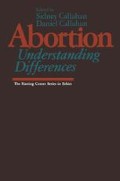Abstract
Within the circle of Christian theological ethicists who converse in “the academy, ” as I do, it is definitely not in vogue to voice opposition to the prochoice position. This position is often believed to be en-tailed in a serious commitment to sexual autonomy, to feminism, and to enlightened, humanistic causes in general. To some extent, my contribution to this project is a reaction against that assumption.
Although any worthwhile moral argument must stand unsupported by authorial expressions of intention, the nature of this project on “abortion and values” creates a special context for indicating the experiences and commitments out of which particular arguments have evolved. Though my essentially conservative attitude toward the fetus is not entirely relative to my personal history, I acknowledge that familial, religious, and academic influences can augment an inclination to highlight certain features of abortion (and its relation to broader cultural values) and to downplay others.
In my case, it is difficult to disentangle religious from more properly “intellectual” sources of influence, as my academic discipline is theological ethics. I was raised a Roman Catholic, a communion with which I continue to affiliate, and was educated generally to think of unborn humans as “babies” who are to be cherished. Abortion, however, appears not to have loomed as large on the Catholic moral agenda of the 1950s and 1960s as it does in the post-1973 prolife movement. In the moral universe of my upbringing, it was taken for granted that abortion was wrong, but that fact was not belabored. Perhaps for that reason, I regard a single-issue focus on abortion as a distortion of what ought properly to be a Christian and human concern about the value and the quality of human life in all its forms and conditions. I understand the essence of the Catholic position on abortion (as permitted only when the life of the mother is endangered, and only then under special circumstances) to be congruent with the positive valuation of prenatal life in the Christian tradition. My own view of the very limited justifiability of abortion is consistent with this traditional thrust, though I would modify the contemporary Church’s teaching in the direction of more flexibility in exceptional instances.
As a professional ethicist I do not identify my research or teaching as “Catholic” in an exclusive sense. I graduated from one Jesuit university (the University of Santa Clara) and am now on the faculty of another. My studies for the master’s and doctoral degrees were completed at the University of Chicago Divinity School, currently an interdenominational institution of Baptist origin. In graduate work and subsequently among colleagues, I have enjoyed exposure to contrasting points of view well argued, and thus, I have been privileged to pursue a critical sense of my own religious tradition. The work of my dissertation director, James M. Gustafson, represents the sort of accomplished moral analysis to which I aspire, along with many more of his students and former students. His moral evaluation of abortion differs from mine, but the ecumenicity and the circumspection of judgment with which he approaches controverted questions continues to be instructive.
My theoretical position on abortion (that the fetus deserves serious but not absolute consideration) has been confirmed rather than challenged by my experiences of pregnancy and parenthood, with the difference that my view of the mother—fetus relation is now “from the inside out” rather from detached observation. Motherhood has heightened my sensitivity to the vulnerability of the fetus and its concomitant need for protection, as well as to the “otherness” of the fetus and the burden that it imposes when the needs of mother and fetus are incompatible.
Access this chapter
Tax calculation will be finalised at checkout
Purchases are for personal use only
Preview
Unable to display preview. Download preview PDF.
References
Daniel Callahan, Abortion: Law, Choice, and Morality( New York: Macmillan, 1970 ), pp. 384 – 390.
Judith Jarvis Thomson, “A Defense of Abortion,” Philosophy and Public Affairs 1 (Fall 1972), pp. 47–66.
Louis Janssens, “Artificial Insemination: Ethical Considerations,” Louvain Studies 8 (Spring 1980), pp. 5–6.
. Michael Tooley and Laura Purdy, “Is Abortion Murder?,” in Robert Perkins, ed., Abortion: Pro and Con( Cambridge, Mass.: 1974 ), p. 134.
Joseph Donceel, S.J., “Animation and Hominization,” Theological Studies31 (March 1970), pp. 76 – 105.
Daniel Callahan, “Minimalist Ethics,” Hastings Center Report 11 (October 1981), pp. 19–20. Callahan addressed the question of whether a morality that stresses the autonomy of the individual is a “good-time philosophy,” able to sustain a society in times of affluence but not in times of economic and political stress.
G. E. M. Anscombe, “Modern Moral Philosophy,” Philosophy33 Qanuary 1958 ), p. 18.
Author information
Authors and Affiliations
Editor information
Editors and Affiliations
Rights and permissions
Copyright information
© 1984 The Hastings Center
About this chapter
Cite this chapter
Cahill, L.S. (1984). Abortion, Autonomy, and Community. In: Callahan, S., Callahan, D. (eds) Abortion. The Hastings Center Series in Ethics. Springer, Boston, MA. https://doi.org/10.1007/978-1-4613-2753-0_17
Download citation
DOI: https://doi.org/10.1007/978-1-4613-2753-0_17
Publisher Name: Springer, Boston, MA
Print ISBN: 978-1-4612-9703-1
Online ISBN: 978-1-4613-2753-0
eBook Packages: Springer Book Archive

